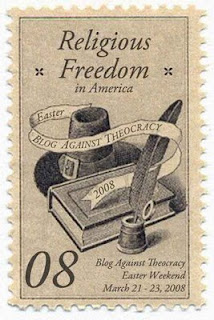
Maybe it is a little silly for me to participate in the annual "Blog Against Theocracy." After all, this isn't a once-a-year topic for me but one I address quite frequently. Still, this does give me an excuse to reflect on the issue of church-state separation and that can't be a bad thing. I'd like to make this contribution more of a personal one by focusing on why I am passionate about preserving the separation of church and state, even widening the gap between them.
In taking an honest look at why I am so devoted to church-state separation, I think it is probably accurate to say that I can boil it down to two reasons. First, I am an atheist, and as such, I recognize that I have no safety in a religiously-infused government. I know full well what proponents of theocracy think of atheists. It is in my self-interest to fight for the separation of church and state because I am imperiled by the alternative.
The second reason for my ongoing focus on church-state separation is that I am convinced that the introduction of religion into government is bad for everyone because religious belief is inherently irrational and destructive. I am for the separation of church and state, in part, because I recognize the costs of religion and consider them excessive.
Those who oppose the Constitutional separation of church and state which has been among America's most important contributions to global politics are unlikely to be swayed by any rational arguments. They want their particular religion, nearly always evangelical fundamentalist Christianity, to be given special status. While they naturally oppose the blending of any other religion with government, they are convinced that theirs is the exception because they are the ones with "the truth."
Even though moderates of many religious traditions recognize that merging religion and government is as bad for religion as it is for government, the Christian extremists who strive for Christian theocracy are willing to take that risk. Remember, these are the sorts who routinely argue that the laws of their god should take priority over our laws. Sounds a bit too much like Iran for my taste.
I'll continue to blog against theocracy year-round, defending reason from those who attack it in the name of religious delusion and opposing Christian extremism as a threat.
For more on this important topic, see The Separation of Church and State Is an Important American Value.
 Easter is an excellent day for mocking Christian beliefs. I'm not advocating the mockery of Christians, and I wouldn't even suggest that all their beliefs deserve mockery. I suspect that most Christians are what could be called "Christian in name only" because they do not actually believe much of the core Christian doctrine. They merely find it familiar and haven't bothered to question much of it. I save my mockery for the beliefs of those who do actually believe this nonsense, rejecting reason, science, and even common sense in pursuit of delusion.
Easter is an excellent day for mocking Christian beliefs. I'm not advocating the mockery of Christians, and I wouldn't even suggest that all their beliefs deserve mockery. I suspect that most Christians are what could be called "Christian in name only" because they do not actually believe much of the core Christian doctrine. They merely find it familiar and haven't bothered to question much of it. I save my mockery for the beliefs of those who do actually believe this nonsense, rejecting reason, science, and even common sense in pursuit of delusion.


